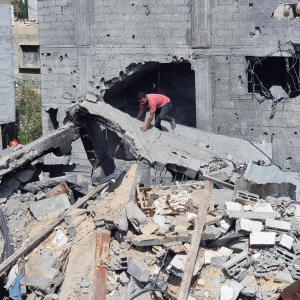Local to Global: Negotiate for peace in Ukraine
| Published: 07-02-2023 3:42 PM |
A sign hung in a Greenfield storefront window: “Negotiate for Peace in Ukraine” — the most direct of the many “Peace,” “and singular “Make Tea Not War;” “Food For All, Not War; “Books Not War;” “Brew Beer Not War;” “Solar Not War;” “Shoes Not War;” “Art Not War” signs in our Greenfield Shops for Peace project.
“Negotiate for Peace in Ukraine” — a concrete application of the other signs — was too charged and controversial for some customers, so it no longer is there.
While deeply disappointed, I was not surprised. When I first held the same sign in our Saturday morning peace vigil on the Greenfield Common, a number of people passing by objected to ending the war until Russia could be defeated, specifically Putin. But, what does an “eye for an eye” strategy achieve other than making “the whole world blind,” as Gandhi observed?
The ultimate weakness of violence, the Rev. Martin Luther King Jr. wisely noted, is that “you may murder the hater, but you do not murder hate. In fact, violence merely increases hate … Darkness cannot drive out darkness: Only light can do that.”
Nearly half of U.S. citizens want their government to keep supplying weapons and military training to Ukraine to sustain the war, while the majority of the world’s people want negotiations to end the war. The global call for ending the conflict includes the rising powers of the global South, among them China; a high-level mission of African countries; a “peace club” of countries being created by Brazil; Pope Francis and the Vatican; Denmark, offering to host a peace summit; the 1,400-city U.S. Conference of Mayors, and hundreds of U.S. organizations and faith-based leaders.
Why are so many countries, organizations and people across the world urging an end to this seemingly regional war, sustained by U.S. and NATO weapons? In a nutshell, this war kills and gravely harms not only the combatants fighting but also millions of others. The global cost is catastrophic.
■ Nearly 100,000 Ukrainians and Russians have died in this war. “Wars often kill far more people indirectly than in direct combat, particularly young children,” according to the Cost of War Project at Brown University.
■ An estimated 250,000 extremely poor people of the global South have died of starvation, and world hunger has doubled, afflicting nearly 350 million people because of war-related grain, fertilizer and seed oil shortages from Ukraine and Russia and the resulting food price inflation.
Article continues after...
Yesterday's Most Read Articles
 Franklin Tech student welds artistic bench for French King Bridge
Franklin Tech student welds artistic bench for French King Bridge
 On The Ridge with Joe Judd: What time should you turkey hunt?
On The Ridge with Joe Judd: What time should you turkey hunt?
 State records show Northfield EMS chief’s paramedic license suspended over failure to transport infant
State records show Northfield EMS chief’s paramedic license suspended over failure to transport infant
 Former Greenfield man granted new trial after 1995 murder conviction, walks free
Former Greenfield man granted new trial after 1995 murder conviction, walks free
 Police report details grisly crime scene in Greenfield
Police report details grisly crime scene in Greenfield
 Formed 25,000 years ago, Millers River a historic ‘jewel’
Formed 25,000 years ago, Millers River a historic ‘jewel’
■ Inflation of energy costs, due to U.S. sanctions on Russia and consequent new drilling for gas and oil by the U.S., have also worsened extreme poverty in the global South, affecting millions of people.
■ International aid desperately needed by developing countries to recover from climate emergencies, conflict and food crises was severely cut and diverted to humanitarian crises in Ukraine. For the rest of the world, 45% of critical life and death assistance was not met.
■ Nature is always the silent casualty of war. This war is no exception, causing extreme pollution in Ukraine: contaminated rivers, toxic smoke and soil from Russian-bombed industrial centers; charred forest; land mines and poisoned agricultural fields; nature reserves reduced to craters; and contaminated scrap metal from destroyed tanks and military equipment.
Millions of tons of climate warming CO2 have been and will be released from war-related oil, gas and jet fuel use; from weapons manufacture and the anticipated rebuilding of Ukraine. The most dangerous of all environmental and health risks is the vulnerable Zaporizhzhia nuclear power plant, which has had fires, damage to power lines, water shortages and threats to its cooling systems.
Most recently, the destruction of the nearby Kakhovka dam endangered tens of thousands of people, animals and other nature downstream.
■ Military spending is surging in the U.S., NATO and Russia and expected to follow throughout Asia — stealing vital resources, as President Dwight Eisenhower presciently warned, from those who need it most. “Every gun that is made, every warship launched, every rocket fired signifies, in the final sense, a theft from those who hunger and are not fed, those who are cold and are not clothed.”
■ According to University of Massachusetts economist Robert Pollin, the world cannot afford a Global Green New Deal — costing some “$4.5 trillion annually” — to prevent “devastating climate chaos” unless “global military spending is curbed at the same time.” All the work of the climate movement will be futile without ending this war via a realizable peace plan and reducing military spending significantly in the U.S. and worldwide for good.
Violence destroys
It destroys:
lives
homes
infrastructure
means of production
and nature …
Honor the [war] dead by ending war.
Honor the living by making peace.
“Memorial Day” by Eric Wasileski, minister, poet and veteran for peace, in “Live Free (or die),” Human Error Publishing.
Join the thousands of citizens urging their senators and representative to support a cease-fire and peace negotiations: Call the U.S. Capitol Hill switchboard at (202) 224-3121.
Pat Hynes of Montague is a retired professor of environmental health, a board member of the Traprock Center for Peace and Justice and a member of Women’s International League for Peace and Freedom.
]]>

 My Turn: Modern wood heat not carbon bogeyman
My Turn: Modern wood heat not carbon bogeyman My Turn: Unneeded, twice-rejected raise back for another vote in Erving
My Turn: Unneeded, twice-rejected raise back for another vote in Erving Pushback: Your home’s power plant could save our energy grid
Pushback: Your home’s power plant could save our energy grid My Turn: How to keep right on killing
My Turn: How to keep right on killing
